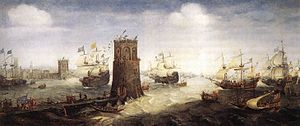Fifth Crusade
| Fifth Crusade | |||||||
|---|---|---|---|---|---|---|---|
| Part of the Crusades | |||||||
 Frisian crusaders confront the Tower of Damietta, Egypt |
|||||||
|
|||||||
| Belligerents | |||||||
| Commanders and leaders | |||||||
|
John of Brienne Bohemond IV Hugh I Kaykaus I Frederick II Leopold VI Albert IV Ludwig I Otto I Pedro de Montaigu Hermann von Salza Guérin de Montaigu Andrew II William I Phillip II Henry I of Rodez † Pelagio Galvani |
Al-Kamil Al-Mu'azzam Al-Mujahid Al-Muzaffar Mahmud Al-Aziz Muhammad Bahramshah |
||||||
| Strength | |||||||
| 32,000 men | Unknown | ||||||
| Casualties and losses | |||||||
| Unknown | Unknown | ||||||
The Fifth Crusade (1213–1221) was an attempt by Western Europeans to reacquire Jerusalem and the rest of the Holy Land by first conquering the powerful Ayyubid state in Egypt.
Pope Innocent III and his successor Pope Honorius III organized crusading armies led by King Andrew II of Hungary and Leopold VI, Duke of Austria, and an attack against Jerusalem ultimately left the city in Muslim hands. Later in 1218, a German army led by Oliver of Cologne, and a mixed army of Dutch, Flemish and Frisian soldiers led by William I, Count of Holland joined the crusade. In order to attack Damietta in Egypt, they allied in Anatolia with the Seljuk Sultanate of Rûm which attacked the Ayyubids in Syria in an attempt to free the Crusaders from fighting on two fronts.
After occupying the port of Damietta, the Crusaders marched south towards Cairo in July 1221, but were turned back after their dwindling supplies led to a forced retreat. A nighttime attack by Sultan Al-Kamil resulted in a great number of crusader losses, and eventually in the surrender of the army. Al-Kamil agreed to an eight-year peace agreement with Europe.
Pope Innocent III had already planned since 1208 a crusade to recapture Jerusalem. In April 1213 he issued the papal bull Quia maior, calling all of Christendom to join a new crusade. This was followed by another papal bull, the Ad Liberandam in 1215.
...
Wikipedia
